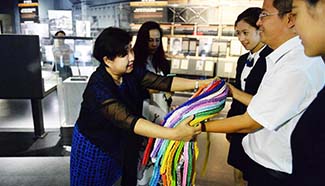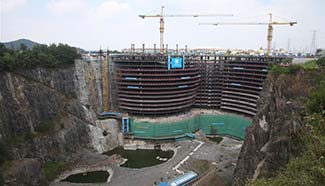
File photo taken on May 24, 2016 shows a music founta in in West Lake in Hangzhou, east China's Zhejiang Province. Hangzhou is the host city for the 2016 G20 summit on Sept. 4 and Sept. 5. With one month to go, Hangzhou looks forward to G20. (Xinhua/Huang Zongzhi)
by Fei Liena
BEIJING, Aug. 16 (Xinhua) -- The upcoming Group of 20 (G20) summit, to be held in east China's Hangzhou on Sept. 4-5, has listed boosting global trade growth as one of its primary targets, as trade is key to economic development and employment.
The agenda also suggests reconstruction of the global value chain, to fundamentally lift the participation capability of developing nations and small and medium-sized enterprises (SMEs).
To echo the call, Jack Ma, founder of China's e-commerce giant Alibaba and chairman of the Business 20 (B20) SME development taskforce, proposed along with other world business moguls to set up an electronic world trade platform (eWTP) during or after the summit, an e-platform driven by private-sector enterprises and run by business rules, to facilitate global trade.
The eWTP would become an open platform for private enterprises and coordination among international organizations, governments and social groups which focus on the development of SMEs and trade. Once established, the eWTP would help SMEs, even individuals, to participate in the global economy through the Internet, Ma said.
Just a few days ago, Alibaba announced a corporate revenue of 32.15 billion yuan (4.85 billion U.S. dollars) in the first fiscal quarter ending in June, surging 59 percent from the same period of last year, the fastest since its Initial Public Offerings in 2014.
The sparkling revenue has exceeded market expectations, and to some extent changed western media's judgement that the "Chinese economy is slowing down." The CNN reported Alibaba's quarterly income by entitling: "What China slow down? Alibaba blows away forecasts." The New York Times said: "For many American investors, Alibaba is seen as a proxy for the health of the Chinese economy and the strength of its consumers."
Born in 1999, the same year of the founding of the G20, the once small e-commerce company has ridden the tide of globalization in the past 17 years, and has rapidly grown into the world's largest retail exchange platform with an annual revenue of 94.38 billion yuan (14.23 billion U.S dollars) in 2015. Its T-mall and Taobao, two dominant retail sub-platforms, have become Chinese consumers' online shopping paradise, especially during the annual "double 11" (Nov. 11) online shopping carnival, also jokingly called the "hand-chopping festival" in China.
In the long run, Alibaba, headquartered in Hangzhou, aims to build a multi-task e-ecological empire to provide comprehensive online to offline services, including living, shopping, payment, entertainment, education, and socialization services, for the "live @ Alibaba" lifestyle in the future.
During the G20 Hangzhou summit, how to invigorate development of the world economy and promote global trade and investment tops the world leaders' discussion agenda. To meet such challenges, business leaders from the G20 members have proposed 20 suggestions on economic growth, global economic and financial governance, international trade and investment, as well as inclusive and inter-connected development, and will submit them to the G20 summit.











